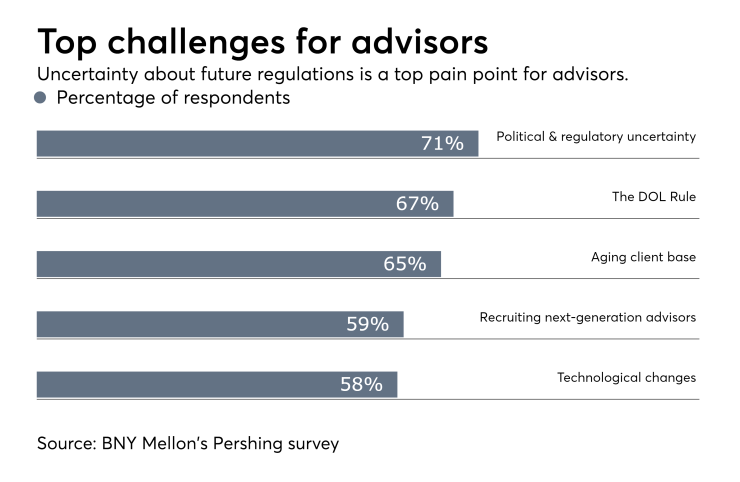Advisors are distracted by the ongoing fiduciary rule drama and see no major changes on their product choices yet, according to a recent study by Pershing.
Political and regulatory uncertainty are advisors' top business challenge, followed by the fiduciary rule, the study shows. Yet the noise in the regulatory debate isn’t going away anytime soon. The Department of Labor recently
The fiduciary rule pushed by the Obama administration has been largely implemented since last June, but one of its most controversial parts — the

Despite the industry’s public outcry against the fiduciary rule, firms have
Despite firm-level changes, advisors have not felt a major impact of the fiduciary rule on their product choices, the study shows. More than half of the respondents say if the rule gets passed in its current version, there will be no change to their product selection for retirees. Meanwhile, nearly a quarter of advisors expect to see increasing product selection, and about a fifth expect choices to decline.
“The decision hasn’t been translated to the advisors yet,” said Rob Cirrotti, managing director and head of investment and retirement solutions at Pershing. With the fiduciary rule delay, companies have not confirmed their changes to product offerings.
-
Financial advisors can still be held liable for violating impartial conduct standards even though the fiduciary rule has been delayed until 2019.
November 29 -
A massive acquisition, the possible end of the Broker Protocol and other issues will shape the industry in 2018.
November 28 -
The regulation's enforcement provisions will not take effect until July 1, 2019, the Labor Department said.
November 27
However, Cirrotti expects that companies will eventually “make significant changes” and restrict financial products available to advisors if the rule takes full effect in its current form. As for now, the delay allows advisors to focus on clients without getting “bogged down by complicated disclosure requirements,” he said.
The noise in regulatory and political debates may be overshadowing longer term challenges facing the industry, the study finds. Although 71% of advisors are interested in adopting more technologies, only 3% of all respondents say they are using a digital advisor platform.
The study surveys 290 advisors from broker-dealers, banks, RIAs and more.





